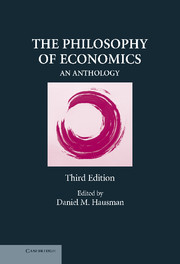Book contents
- Frontmatter
- Contents
- Introduction
- PART ONE CLASSIC DISCUSSIONS
- 1 On the Definition and Method of Political Economy
- 2 Objectivity and Understanding in Economics
- 3 The Nature and Significance of Economic Science
- 4 Economics and Human Action
- 5 Selected Texts on Economics, History, and Social Science
- 6 The Limitations of Marginal Utility
- PART TWO POSITIVIST AND POPPERIAN VIEWS
- PART THREE IDEOLOGY AND NORMATIVE ECONOMICS
- PART FOUR BRANCHES AND SCHOOLS OF ECONOMICS AND THEIR METHODOLOGICAL PROBLEMS
- PART FIVE NEW DIRECTIONS IN ECONOMIC METHODOLOGY
- Selected Bibliography of Books on Economic Methodology
- Index
2 - Objectivity and Understanding in Economics
Published online by Cambridge University Press: 05 June 2012
- Frontmatter
- Contents
- Introduction
- PART ONE CLASSIC DISCUSSIONS
- 1 On the Definition and Method of Political Economy
- 2 Objectivity and Understanding in Economics
- 3 The Nature and Significance of Economic Science
- 4 Economics and Human Action
- 5 Selected Texts on Economics, History, and Social Science
- 6 The Limitations of Marginal Utility
- PART TWO POSITIVIST AND POPPERIAN VIEWS
- PART THREE IDEOLOGY AND NORMATIVE ECONOMICS
- PART FOUR BRANCHES AND SCHOOLS OF ECONOMICS AND THEIR METHODOLOGICAL PROBLEMS
- PART FIVE NEW DIRECTIONS IN ECONOMIC METHODOLOGY
- Selected Bibliography of Books on Economic Methodology
- Index
Summary
Max Weber (1864–1920) was born in Erfurt and taught at the universities of Freiburg, Heidelberg, Vienna, and Munich. He is most often regarded as a sociologist, although he was well educated in economics and took an active role in debates about the methodology of economics. He is perhaps best known for his The Protestant Ethic and the Spirit of Capitalism, in which he maintains that Calvinism was instrumental in the early development of capitalism; but he made a great many fundamental contributions to our understanding of societies. His methodological writings have also been extremely influential. Reprinted here are excerpts from “‘Objectivity’ in Social Science and Social Policy,” which is probably the best known of his methodological writings.
All serious reflection about the ultimate elements of meaningful human conduct is oriented primarily in terms of the categories “end” and “means.” We desire something concretely either “for its own sake” or as a means of achieving something else which is more highly desired. The question of the appropriateness of the means for achieving a given end is undoubtedly accessible to scientific analysis. Inasmuch as we are able to determine (within the present limits of our knowledge) which means for the achievement of a proposed end are appropriate or inappropriate, we can in this way estimate the chances of attaining a certain end by certain available means.
- Type
- Chapter
- Information
- The Philosophy of EconomicsAn Anthology, pp. 59 - 72Publisher: Cambridge University PressPrint publication year: 2007
- 3
- Cited by



